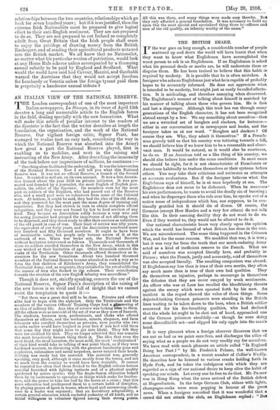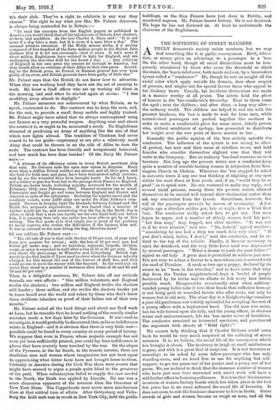BRITISH SHARE.
IF the war goes on long enough, a considerable number of people scattered up and down the world will have learnt that when they want to know what Englishmen have accomplished the worst person to ask is an Englishman. If an Englishman is asked what his personal deeds or merits are, he will understate them or disguise them. He has been trained to believe that this habit is required by modesty. It is possible that he is often mistaken. A foreigner who asks an Englishman just what he is capable of probably hopes to be accurately informed. He does not appreciate what is intended to be modesty, but might just as easily be called affecta- tion. It is misleading, and therefore annoying when discovered. The Englishman's manner of talking about himself is matched by his manner of talking about those who govern him. He is first and last a disparager. Although this trait has run through many generations of the English character, it has not been recognized abroad except by a few. We say something about ourselves—that we are a wretched set of bunglers and slackers, for instance— either in our conversation or in newspapers and books, and the foreigner takes us at our word. " Bunglers and slackers ? Of course they are. Why, they admit it themselves." If a French- man gravely told us that his country was tottering towards a fall, we should believe him if we knew him to be a reasonable and obser- vant man. It would be natural, as it would also be courteous, to do so. If an American told us a like thing of his country, we should also believe him under the same conditions. In most cases we should be right, for it is not characteristic of Frenchmen or Americans habitually to traduce themselves or their systems before others. You may take their criticisms and estimates as attempts at accurate evaluations. But if the foreigner believes what the Englishman says of himself, he is at once hopelessly at sea. The Englishman does not mean to be dishonest. When he measures his own performances, he wants to avoid the deadly sin of boasting ; and when he disparages those who rule over him, he speaks out of a native sense of independence which has, one supposes, to be con- tinually gratified lest it should die of disuse. Of course, the Germans (except Herr Harden and a very few others) do not talk like this. In their amazing docility they do not want to do so. Even if they wanted to, they would not be allowed to do it.
Our national characteristic bears very closely upon the opinion which the world has formed of what Britain has done in the wall We are misunderstood. The same thing happened in the Crimean War, and for the same reasons. We muddled that war, it is true ; but it was very far from the truth that our much-enduring Army acted as a kind of inefficient reserve to the French. What we said of ourselves was accepted literally here, and probably ie France ; what the French, justly and accurately, said of themselves was also accepted literally. The resulting comparison was absurd. If Englishmen say less than is true of their own merits, they often say much more than is true of their own bad qualities. They do themselves an injustice, perhaps to encourage in themselves the delusion that they are never swayed by weak sentiments. An officer who was at Loos has recalled the bloodthirsty threats against the enemy which were spouted forth by his men. An incident in the sequel showed the value of these things. Some dejected-looking German prisoners were standing in the British lines waiting to be taken down to the base, when a British soldier renowned for his fire-breathing qualities, who had declared that the whole lot ought to be shot out of hand, approached one of the German prisoners stealthily—as though he were doing some discreditable act—and slipped his only apple into the man's hand.
It is very pleasant when a foreign observer discovers that we
are not so bad as we paint ours-Aves, and discharges the office of saying what as a people we do not very readily say for ourselves. We have read with much pleasure an article called " Is England Doing her Part ? " by Mr. Frederick Palmer, the well-known American correspondent, in a recent number of Collier's Weekly. He describes how he listened to various cranks holding forth in Hyde Park, and he takes the indulgence with which they are regarded as a sign of our national desire to keep alive the habit of speaking our minds. Let every one be free to do that. Mr. Pa.mer was in Hong Kong when the news arrived of the British defeat at Magersfontein. In the large German Club, ablaze with lights, champagne-corks were soon popping in honour of the great news. When a foreigner remarked that it was wonderful that a crowd did not attack the club, an Englishman replied : " But it's their club. They've a right to celebrate in any way they choose." The right to say what you like, Mr. Palmer discovers, is always being contended for in Britain:— "To read the excerpts from the English papers as published in America you would think that all the inhabitants of Britain were slackers, strikers, and muddlers. As the late Charles A. Dana said : ' It is not news if a dog bites a man, but it is news if a man bites a dog.' The unusual attracts attention. If the Welsh miners strike, if a society composed of five hundred of the forty million people in the British Isles declares that it is for non-resistance—that is news. It isn't news if three million Englishmen have enlisted to fight for England, and are undergoing the merciless drill for ten hours a day. . . . Any criticism of England in her own press the censors let through to America, but they would allow no criticism of their Allies in their own press. Accord- ing to the British press, no French or Russian general has ever been guilty of an error, and British generals have been guilty of little else."
Mr. Palmer says that the British do not know how to advertise. When they are working hard they have not the art of seeming to work. He knew a Staff officer who sat up working till three in the morning, and said when he started again at seven : " I was muddling away almost to daylight."
Mr. Palmer measures our achievement by what Britain, so to speak, contracted to do. Her contract was to keep the seas, and, for the rest, to provide a small Army mobile and highly trained.
Mr. Palmer might have added that we always contemplated using our finance as a very powerful weapon. Anything over and above
the contract is, or ought to be, accounted a merit. No Englishman dreamed of producing an Army of anything like the size of that which now fights abroad. The tradition of Chatham had never ceased to be our guide—supremacy at sea plus a relatively small Army that could be thrown in on the side of Allies to turn the scale. The contract has been literally and scrupulously honoured, and how much has been done besides ! Of the Navy Mr. Palmer says :-
" A witness of its efficiency exists in every British merchant ship that sails. No German sails the open seas unless in disguise. Many more than a million British soldiers are abroad, and all their guns, and the food for both men and guns, have been transported safely oversea ; and by sea the wounded have been brought home. So far as I know, not a soldier or gun has been lost in the passage from France to England. British sea-borne trade, including exports, increased for the month of February, 1916, over February, 1915. Channel steamers run as usual. Passengers and freight go and come between England and France and America in spite of the submarine. Including the regular naval and the auxiliary vessels, some 3,000 ships are under Sir John Jellicoe's com- mand. Success in keeping tight the blockade between Iceland and the North ScS surpasses expectations. It was feared that a number of raiders might get by, and considering that the fog in the North Sea is often eo thick that a man can hardly see his own hand held out before him, it is amazing that only one raider has been able to get by at this writing. The fuss made over that single one is proof of the pudding to naval experts, who realize the difficulties if the layman does not. It was as unusual as the man biting the dog, therefore news."
Of our soldiers Mr. Palmer says :-
" The old rule of war is that with the loss of 10 per cent. of your total force you prepare for retreat ; with the loss of 15 per cent. you had better get under way ; and no battalion, regiment, brigade, division, corps, or army is expected to hold after a loss of 25 or10 per cent. This was about the percentage at Waterloo and Gettysburg. British regi- ments in the first battle of Ypres used to cheer when the German infantry charged, for this meant the end of the torrent of shell fire, and they could go out to meet the enemy with the bayonet. In the mud and icy water they stood in a number of instances after losses of 50 and 60 and 70 and 80 per cent."
Then, in a delightful sentence, Mr. Palmer hits off our attitude towards our own efforts " One million volunteers and England reviles the slackers ; two million and England reviles the slackers still harder ; three million and she reviles the slackers harder yet in tones heard over the world and taken by those who don't know these stubborn islanders as proof of their failure out of their own mouths."
Mr. Palmer noted all the bard things said about our Staff work
at Loos, but he remarks that he heard nothing of the exactly similar mistakes made a few days later by the Germans. If one cared to investigate, it would probably be discovered that, so far as indifference exists in England—and it is obvious that there is very little now— parallels could be found in every country at every period of history. We suppose that even in France, whose majestic example has not even yet been sufficiently praised, you could lay bare indifference in places that have scarcely been touched by the war. On the slopes of the Pyrenees, in the far South, in the remote interior, there are
doubtless men and women whose imagination has not been equal to appreciating what bitter facts have not brought home to them. Certainly in America during the Civil War there were events that might havo seemed to argue a people quite blind to the greatness of the peril. When voluntaryism failed to supply the men needed in the North, the Draft was applied by Lincoln. No one was a snore clamorous opponent of the measure than the Governor of
isiew York State. The Copperheads were never more mischievous than at that critical turn of affairs. After Gettysburg and Vicks- burg the Irish mob rose in revolt in New York City, held the public)
buildings, as the Sinn Feiners have just done in Dublin, and murdered negroes. Mr. Palmer knows history. He is not deceived. We hope ho has not flattered us. At least he understands the character of the Englishman.































 Previous page
Previous page